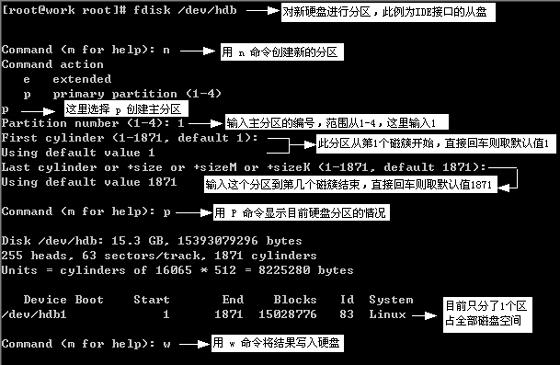用vsftp自架Linux网络安装服务器,以及Redhat局域网安装的解决办
为了验证局域网网络安装Linux,近两天做了一个实验,目的就是为了写一个比较完整的帖子。约定:
1。本帖操作环境是Redhat 9.0,VSFTPD的版本是Redhat 9.0所带的vsftpd-1.1.3-8.i386.rpm,在安装盘的第三张中
2。VSFTPD实现的最基本的目的:用系统中存在的真实用户能登入FTP,能用匿名访问。
3。服务器的IP和和DNS设定
第一块网卡
IP:192.168.0.1
子掩码:255.255.255.0
网关不设置:
第二块网卡:
IP:192.168.0.2
子掩码:255.255.255.0
网关不设置
因为我的操作环境是一个小型的局域网,所以其它的机器的IP都是在192.168.0这个网段上。ADSL是接在服务器的第一个网卡上。服务器的第二个网卡是接集线器,其它的客户机都是接在集线器上。为了能让ADSL访问internet,因为自己手动设置了IP,所以DNS也要自己来设置,DNS如下:
202.96.134.133
202.96.168.68
设置工具是:
[root@linuxsir001 root]# redhat-config-network
一。用VSFTP来架设FTP服务器,VSFTP服务器是目前最好的FTP服务器软件,优点是体积小,可定制强,效率高
1。查看是否安装了vsftpd软件
[root@linuxsir001 root]# rpm -qa | grep vsftpd
如果没有任何显示,说明没有把vsftpd安装上,如果出现的是下面的这样的提示,就证明已经安装上了。
[root@linuxsir001 root]# rpm -qa | grep vsftpd
vsftpd-1.1.3-8
我以Redhat 9.0,以其自带的vsftpd包vsftpd-1.1.3-8版本来为本帖约定。
[root@linuxsir001 root]# rpm -ivh vsftpd*.rpm
2。打开VSFTP服务器。
[root@linuxsir001 root]# ntsysv
把vsftpd服务器打开,也就是在运行 ntsysv命令后,把vsftpd服务选中。
[*] vsftpd
3。运行/etc/init.d/vsftpd start
[root@linuxsir001 root]# /etc/init.d/vsftpd start
为 vsftpd 启动 vsftpd: [ 确定 ]
[root@linuxsir001 root]#
4。配制VSFTP,FVSFTP的运行有两种模式,一种是stardard "initd模式,另外一种是xinetd模式,上面我们所说的就是stardard initd运行模式。两种模式运行机制不是相同的,stardard initd模式,适合专业FTP,且FTP总是一直有人访问,占用资源也是比较大,如果您的FTP总是有人访问和登入。就要用这种模式。如果您的FTP访问人数比较小,建议您用xinetd模式。xinetd模式,是当用户请求时,vsftpd才会启动。
不同的环境,当然得用不同的启动模式。
如果想了解更多的,请在本帖后面跟帖,我会慢慢补充xinetd模式,以及虚拟用户如何设置方面的问题。
1]我们主要把vsftp的配制文件改一下就行了。配制文件在/etc/vsftpd/vsftpd.conf,用您喜欢的编辑器打开。请参考下面的配制文件。
# Example config file /etc/vsftpd.conf
#
# The default compiled in settings are very paranoid. This sample file
# loosens things up a bit, to make the ftp daemon more usable.
#
# Allow anonymous FTP?
anonymous_enable=YES
#
# Uncomment this to allow local users to log in.
local_enable=YES
#
# Uncomment this to enable any form of FTP write command.
write_enable=YES
#
# Default umask for local users is 077. You may wish to change this to 022,
# if your users expect that (022 is used by most other ftpd's)
local_umask=022
#
# Uncomment this to allow the anonymous FTP user to upload files. This only
# has an effect if the above global write enable is activated. Also, you will
# obviously need to create a directory writable by the FTP user.
#anon_upload_enable=YES
#
# Uncomment this if you want the anonymous FTP user to be able to create
# new directories.
#anon_mkdir_write_enable=YES
#
# Activate directory messages - messages given to remote users when they
# go into a certain directory.
dirmessage_enable=YES
#
# Activate logging of uploads/downloads.
xferlog_enable=YES
#
# Make sure PORT transfer connections originate from port 20 (ftp-data).
connect_from_port_20=YES
#
# If you want, you can arrange for uploaded anonymous files to be owned by
# a different user. Note! Using "root" for uploaded files is not
# recommended!
#chown_uploads=YES
#chown_username=whoever
#
# You may override where the log file goes if you like. The default is shown
# below.
#xferlog_file=/var/log/vsftpd.log
#
# If you want, you can have your log file in standard ftpd xferlog format
xferlog_std_format=YES
#
# You may change the default value for timing out an idle session.
#idle_session_timeout=600
#
# You may change the default value for timing out a data connection.
#data_connection_timeout=120
#
# It is recommended that you define on your system a unique user which the
# ftp server can use as a totally isolated and unprivileged user.
#nopriv_user=ftpsecure
#
# Enable this and the server will recognise asynchronous ABOR requests. Not
# recommended for security (the code is non-trivial). Not enabling it,
# however, may confuse older FTP clients.
#async_abor_enable=YES
#
# By default the server will pretend to allow ASCII mode but in fact ignore
# the request. Turn on the below options to have the server actually do ASCII
# mangling on files when in ASCII mode.
# Beware that turning on ascii_download_enable enables malicious remote parties
# to consume your I/O resources, by issuing the command "SIZE /big/file" in
# ASCII mode.
# These ASCII options are split into upload and download because you may wish
# to enable ASCII uploads (to prevent uploaded scripts etc. from breaking),
# without the DoS risk of SIZE and ASCII downloads. ASCII mangling should be
# on the client anyway..
#ascii_upload_enable=YES
#ascii_download_enable=YES
#
# You may fully customise the login banner string:
#ftpd_banner=Welcome to blah FTP service.
#
# You may specify a file of disallowed anonymous e-mail addresses. Apparently
# useful for combatting certain DoS attacks.
#deny_email_enable=YES
# (default follows)
#banned_email_file=/etc/vsftpd.banned_emails
#
# You may specify an explicit list of local users to chroot() to their home
# directory. If chroot_local_user is YES, then this list becomes a list of
# users to NOT chroot().
#chroot_list_enable=YES
# (default follows)
#chroot_list_file=/etc/vsftpd.chroot_list
#
# You may activate the "-R" option to the builtin ls. This is disabled by
# default to avoid remote users being able to cause excessive I/O on large
# sites. However, some broken FTP clients such as "ncftp" and "mirror" assume
# the presence of the "-R" option, so there is a strong case for enabling it.
#ls_recurse_enable=YES
pam_service_name=vsftpd
userlist_enable=YES
#enable for standalone





